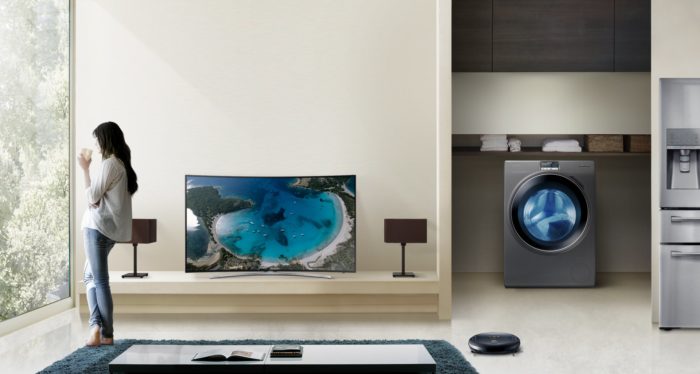In Alex Garland’s Ex Machina (2015), an eccentric tech billionaire invites a programmer out to his mansion to conduct a Turing’s test on his humanoid robot. No less alluring than the beautiful robot, however, is the scene-stealing house itself: a Frank Lloyd Wright-esque edifice sitting on top of a waterfall in the middle of alpine mountains. It’s both postmodern and organic. Scene after scene feels like the most elevated form of house porn–who wouldn’t want to live in that sanctum of flawless technology?
It appears that tech companies around the world agree, as they churn out their marketing juggernauts promising that their smart home systems will get you living like a sci-fi mogul.
 Samsung’s smart home ad could be an outtake of Ex Machina—with a slightly more domestic touch.
Samsung’s smart home ad could be an outtake of Ex Machina—with a slightly more domestic touch.
Unfortunately, the aspirational ads of wall-to-wall glass showing lush greenery don’t mean that smart homes are actually environmentally friendly. Far from it–smart homes and by extension, the Internet of Things, is on track to add astronomical amounts of unnecessary emissions in the coming years.
Smart homes and connected devices are essentially little computers, which is implied in the term Internet of Things. Light switch and TV that are controlled by one smart home device is essentially trading data–and data may be invisible, but it’s certainly not free. It’s worth noting that data centers used by Big Tech are gargantuan warehouses of circuitry, cables, and cooling system, and that these are surprisingly concentrated in one area of the world. Little known though it is, Loudoun County in Virginia is the home of data centers of about 3,000 tech companies: it is estimated that 70% of the world’s online traffic passes through this cheap-energy area near Washington D.C. (Just this week, news broke that Amazon may choose Northern Virginia–an area encompassing Loudoun–as the site of one of its two new headquarters).
So what kind of energy does 70% of the world’s online traffic use? It’s generated by a power company named Dominion, and according to a 2017 Greenpeace report, only 1% of Dominion’s total electricity comes from renewable sources, and 98% of it is split between coal, gas, and nuclear power. To justify its use of non-renewable energy, Dominion has cited the insatiable demand from data centers–surely set to skyrocket even more if Amazon moves into the area.
To put our data gluttony into perspective, consider the fact that using a tablet or a smartphone to stream just an hour of video uses the same amount of electricity (largely at the data center) as 2 domestic fridges running continuously for a week. Data centers are on track to produce more carbon emissions than global transportation by cars and trucks (currently at 14% of total emissions).
The growing smart home market is only pouring more fuel to the wildfire that is data explosion. In 2018, global smart home market amounted to $48.7 billion. It’s expected to continue to grow at an annual rate of 25.8% to reach $122 billion by 2022. Currently, 7.5% of households have a smart home device, and it’s expected to hit 19.5% by 2022.
The most ignominious aspect of this may be that smart homes largely provide services that are inconsequential. The “best” functionalities that smart homes offer range from answering what time it is to finding restaurants that are near by: it’s simply not anything you can’t do already without draping your home in wireless technology. Alexa may save you a couple of seconds of typing on your phone or computer, but ultimately it has a pretty small added value of novelty and entertainment. In The LA Times, journalist Michael Hiltzik astutely writes that “it’s not that they don’t have a fair number of functions around the home, but that they do almost nothing that can’t be done just as easily by other means–or more easily.“
Twenty years ago, public ad campaigns asked us to unplug our electronic devices before leaving the home in order to save energy and offset carbon. Now, corporate ads are telling us we should plug everything into the cloud, no matter the cost to the environment.
If that’s not enough to convince you to forego smart homes, consider the additional electromagnetic waves to which you are subjecting your body for no very good reason. Electromagnetic fields (EMFs) from internet-using devices are designated as “possibly carcinogenic to humans” by the World Health Organization and the International Agency for Research on Cancer. Some people who are more sensitive to EMFs experience headaches, brain fog, poor sleep, and infertility from too much exposure. And remember, we haven’t had wireless technology for long enough to truly know what the long-term health effects will be–just as X-rays were thought to be completely safe in the 1920s and radioactive substances were made into wristwatches in the 1950s. If you put your smartphone away from your head and avoid sleeping with your laptop, why on Earth would you add 24/7 wireless devices all over your house?
This is not to say all technology is bad. If smart homes cooked you a warm dinner, took care of the clean-up automatically, vacuumed the carpet, cleaned out the litter box, and took out recycling while you rested from a long day’s work, the energy suck might be justified. But smart homes are essentially toys for grownups–and they are not worth the exponential cost to the environment.
How do you feel about the smart home hype?
Related: These 4 Kitchen Tools Will Help You Go Zero Waste & Make Vegan Food Magic
Blue Light From Devices Spells Disaster For Your Skin. How To Protect Yourself
Get more like this—Subscribe to our daily inspirational newsletter for exclusive content!
__
Photo: Juvet Hotel; Samsung





